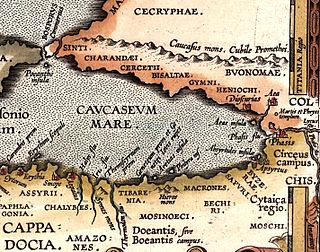 W
WPontus or Pontos is a region on the southern coast of the Black Sea, located in modern-day eastern Black Sea Region of Turkey. The name was applied to the coastal region and its mountainous hinterland by the Greeks who colonized the area in the Archaic period and derived from the Greek name of the Black Sea: Εύξεινος Πόντος (Eúxinos Póntos), "Hospitable Sea", or simply Pontos as early as the Aeschylean Persians and Herodotus' Histories.
 W
WBatumi is the second largest city of Georgia and the capital of the Autonomous Republic of Adjara, located on the coast of the Black Sea in Georgia's southwest. It is situated in a subtropical zone at the foot of the Caucasus. Much of Batumi's economy revolves around tourism and gambling, but the city is also an important sea port and includes industries like shipbuilding, food processing and light manufacturing. Since 2010, Batumi has been transformed by the construction of modern high-rise buildings, as well as the restoration of classical 19th-century edifices lining its historic Old Town.
 W
WDankiyo, is an ancient word from the text of Evliya Çelebi (17th century, Ottoman Era "The Laz's of Trebizond invented a bagpipe called a dankiyo..." describing the Pontian tulum, a type of bagpipe which the ancient Greeks called an askaulos. It consists of a lamb skin, a blow pipe, and the double reed chanter.
 W
WGümüşhane or Gyumushkhana is a city and the capital district of Gümüşhane Province in the Black Sea region of Turkey. The city lies along the Harşit River, at an elevation of 5,000 feet (1,500 m), about 40 miles (64 km) southwest of Trabzon. According to the 2010 census, population of Gümüşhane urban center is 28,620. The district covers an area of 1,789 km2 (691 sq mi), and the city lies at an elevation of 1,153 m (3,783 ft). Coordinates on world : 40°27′35″N 39°28′40″E
 W
WThe Kingdom of Pontus was a Hellenistic-era kingdom, centered in the historical region of Pontus and ruled by the Mithridatic dynasty of Persian origin, which may have been directly related to Darius the Great and the Achaemenid dynasty. The kingdom was proclaimed by Mithridates I in 281 BC and lasted until its conquest by the Roman Republic in 63 BC. The Kingdom of Pontus reached its largest extent under Mithridates VI the Great, who conquered Colchis, Cappadocia, Bithynia, the Greek colonies of the Tauric Chersonesos, and for a brief time the Roman province of Asia. After a long struggle with Rome in the Mithridatic Wars, Pontus was defeated. Part of it was incorporated into the Roman Republic as the province Bithynia et Pontus; the eastern half survived as a client kingdom.
 W
WMelanchlaeni may refer to three ancient tribes.
 W
WMossynoeci is a name that the Greeks of the Euxine Sea applied to the peoples of Pontus, the northern Anatolian coast west of Trebizond.
 W
WNiksar /'niksar/ is a city in Tokat Province, Turkey. It was settled by many empires, being once the capital city of the province. Niksar is known as "Çukurova of the North-Anatolia" due to its production of many kinds of fruits and vegetables except citrus fruits. On 02 Mai 2018 Niksar was included in the World Heritage tentative list.
 W
WPaphlagonia was an ancient region on the Black Sea coast of north central Anatolia, situated between Bithynia to the west and Pontus to the east, and separated from Phrygia by a prolongation to the east of the Bithynian Olympus. According to Strabo, the river Parthenius formed the western limit of the region, and it was bounded on the east by the Halys river. The name Paphlagonia is derived in the legends from Paphlagon, a son of Phineus.
 W
WThe Tibareni were a people residing on the coast of ancient Pontus referred to in Herodotus, Xenophon, Strabo and other classical authors.
 W
WZile, anciently known as Zela, is a city and a district of Tokat Province, Turkey. Zile lies to the south of Amasya and the west of Tokat in north-central Turkey. The city has a long history, including as former bishopric and the site of the Battle of Zela, which prompted the phrase "Veni, vidi, vici." Today the city is a center for agricultural marketing and tourism.